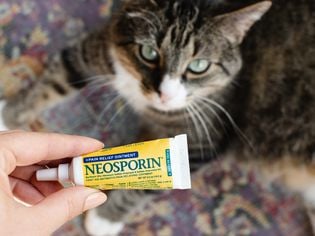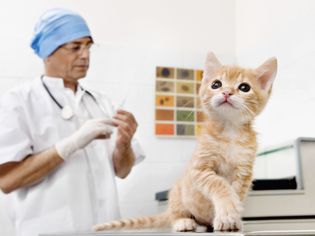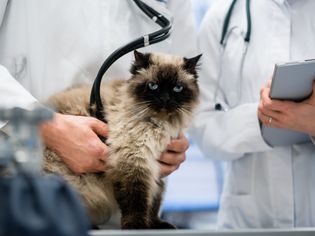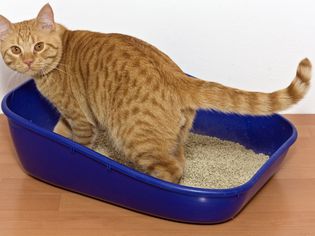Addison's disease is a disease of the adrenal glands. It causes decreased production of a vital steroid hormone called aldosterone. While many animals, including humans and dogs, can develop Addison's disease, it is rare in cats. When it does occur, it mostly strikes middle-aged cats, leading to symptoms that include vomiting, weight loss, lethargy, and loss of appetite. If left untreated, Addison's disease can eventually cause kidney failure or cause the cat to go into shock. Luckily, if treated before the disease becomes severe, most cats go on to lead normal lives, but will require lifelong medication.
What Is Addison's Disease?
Addison's disease, also known as hypoadrenocorticism, is a disease of the adrenal glands. Located right in front of the kidneys, these small glands produce several hormones that are crucial for maintaining proper body function. Addison's disease occurs when the adrenal glands are unable to produce enough aldosterone. This steroid hormone plays a vital role in balancing the levels of potassium and sodium in the bloodstream. As a result of the low aldosterone production, excessive amounts of potassium and reduced amounts of sodium accumulate in the cat's blood, leading to cardiovascular and other organ complications.
Symptoms of Addison's Disease in Cats
Cats with Addison's disease may not be consistently sick until the disease has progressed. Early on, your cat may have periods of being well followed by periods of lethargy, vomiting, weight loss, and lack of appetite.
It's easy to overlook the signs of Addison's disease, as in many cats, it initially presents only with occasional spells of lethargy, lack of appetite, and weight loss. Some cats will have bouts of vomiting, as well. Since these are common symptoms of many minor ailments, many owners don't consider them important enough to seek veterinary care for their cats, particularly because the cat generally seems well between the attacks of illness.
Unfortunately, when left untreated, the condition can progress, eventually leading to an adrenal crisis (failure of the adrenal glands) where the cat goes into kidney failure and shock. This typically presents as extreme weakness, slow heartbeat, and severe dehydration. At this point, without prompt veterinary care, the cat is likely to die.
Causes of Addison's Disease
Addison's disease is rare in cats. It is thought to occur as a result of an autoimmune condition where the body's own immune system attacks the adrenal glands, causing damage that reduces hormone production. It can also occur if a cat has an adrenal gland mass or tumor, although this is very uncommon.
Diagnosing Addison's Disease in Cats
In order to diagnose a cat with Addison's disease, your veterinarian will start by performing a full physical examination and obtaining a patient history. If Addison's disease is suspected, a series of diagnostic tests will be recommended to check organ function and look for any indications of disease. Typically, the cat will have very high blood levels of potassium and abnormally low levels of sodium. Blood tests of kidney function may also be abnormal.
To confirm the diagnosis, your vet will likely also order an ACTH (adrenocorticotropic hormone) stimulation test. The test involves checking the cat's response to an injection of ACTH. A cat with Addison's disease will show reduced hormonal response to the injection.
Treatment
The severity of your cat's Addison's disease will determine the treatment course. If the cat is in shock or adrenal crisis, then emergency treatment will include IV fluids to help correct dehydration and restore electrolyte levels to normal. Possibly, your veterinarian will start emergency steroid treatment as well.
Hormone replacement treatment can often be started while the animal is being stabilized. Addison's disease cannot be cured, so lifelong management of the disease is necessary with the use of medications. Typically, your cat will require two medications: a steroid, such as prednisone or hydrocortisone and a mineralocorticoid medication, such as DOCP, which helps regulate blood levels of electrolytes, including sodium and potassium. Most cats will be on these two medications for the rest of their lives. Both can be given as a long-lasting injection or a daily pill. Using pill pockets can make it easier to administer your cat's medication.
Because periods of stress can trigger an adrenal crisis, your vet might recommend adjusting medications whenever your cat is likely to be stressed, such as during a move, when introducing a new pet to the home, or when your cat needs to stay at a kennel or boarding facility.
Prognosis for Cats With Addison's Disease
With treatment, most cats with Addison's disease lead fairly normal lives. They will require more frequent veterinary checkups than the average cat, however. The prognosis is poorer for cats that experience adrenal crisis or that have Addison's disease brought on by a tumor rather than an autoimmune disease.
How to Prevent Addison's Disease
Because Addison's disease is caused by an uncommon autoimmune response, it cannot be predicted or prevented in cats. However, feeding your cat a balanced diet, maintaining a healthy weight, providing play and exercise opportunities, and taking your cat for regular veterinary checkups can help keep your pet in tiptop shape and ward off other health issues that might reduce your cat's overall quality of life.










Comments on " Addison's Disease in Cats" :